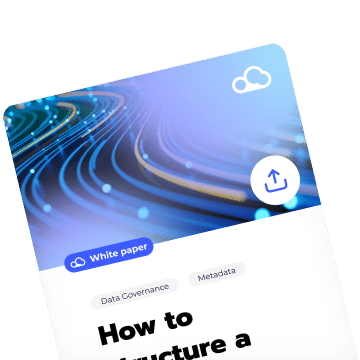As organizations increasingly rely on data to drive decisions and forge the future, the need for strategic data leadership is more important now than ever before. The role of Chief Data Officer (CDO) stands at the forefront of this transformation to lead both data and business teams toward organizational success. This article offers a roadmap with actionable advice for those aspiring to enter this dynamic executive role.
Whether you’re on the path or just exploring the possibility, fully grasping the roles, responsibilities, and significance of the CDO role is a crucial first step. In this blog, we’ll discuss the essential skills, experiences, and strategies needed to prepare for this ever-evolving position.
Understanding the Chief Data Officer Role
The role of a CDO can vary significantly across sectors, with each industry presenting unique demands for skills and competencies. CDOs focus on data governance, compliance, and risk management in finance-related fields. In healthcare, the focus is on managing patient data, enhancing care through analytics, and upholding privacy standards like HIPAA. In tech, CDOs lead innovation, drive product development, and improve customer experience with data insights.
Despite these sector-specific differences, the core responsibilities of a CDO are universal. The breadth of their role includes:
- Data operations: Leading the collection, storage, and usability of data to optimize business operations
- Data quality: CDOs champion data quality, assuring its accuracy and reliability for informed decision-making
- Data analytics: Driving organizational growth by leveraging analytics to uncover new opportunities
- Data governance & security: CDOs lead governance initiatives and safeguard data against threats
- Data literacy: CDOs promote data literacy across an organization by developing initiatives to improve the understanding and effective use of data among all staff.
Key skills & competencies for aspiring CDOs
To become a Chief Data Officer, it’s important to cultivate a diverse skill set. Technical expertise in data analytics, management, and data security forms the backbone of a CDO’s talents, but technical prowess alone isn’t enough.
Required competencies for CDO roles can include:
- Strategic data utilization: Mastery in using data to boost organizational efficiency and productivity and to uncover new business opportunities
- Technical expertise & leadership: Competency in advanced technologies like AI and machine learning, combined with the ability to lead and develop teams aligned with organizational culture and goals
- Data governance & collaboration: Skill in establishing and maintaining data governance policies by collaborating with executives and stakeholders for data security and compliance
- Leadership & strategic thinking: The ability to envision and drive data-centric strategies aligned with organizational objectives and foster a culture of innovation and data literacy
- Communication skills: Expertise in articulating data insights clearly to stakeholders and integrating data into business strategies
- Adaptability & continuous learning: The passion to remain agile, continuously improving their knowledge and expertise
By cultivating these skills and competencies, you’ll prepare and position yourself at the forefront of future data leadership opportunities.
Educational background & diverse career trajectories
Preparing to enter a Chief Data Officer role begins with a solid educational foundation. Computer science, data analytics, and business administration are standard disciplines in CDO backgrounds. Advanced degrees like an MBA or Master’s in data science are particularly beneficial, as they demonstrate both technical knowledge and business acumen.
However, the path to becoming a CDO isn’t a narrow highway. These executives emerge from a variety of backgrounds: Many begin in technical positions, such as data analysts or IT managers, and gradually transition to leadership. Others start in business or consulting to develop a keen understanding of how data drives decision-making and strategy.
This diversity of career trajectories reflects the multi-dimensional nature of the CDO role. What’s essential is a blend of experience in data management, strategic thinking, and leadership skills. Whether your path is direct or unconventional, the combination of advanced education and professional experiences will equip you for a career as a Chief Data Officer.
Education & diverse career journeys
Gaining pertinent experience is crucial for aspiring CDOs: Those interested must seek roles that offer direct exposure to data management and analytics. Positions like Data Analyst, Database Manager, or Business Intelligence Specialist can provide critical hands-on experience and offer necessary exposure and expertise in data processing, analysis, and visualization.
To cultivate data leadership, it’s important to pursue opportunities to lead project teams even in modest undertakings. Spearhead a data-driven project within your department or volunteer to manage a team in a cross-functional initiative to develop crucial leadership and communication skills and earn a reputation as a valued contributor to data initiatives.
Networking & mentorship
For aspiring Chief Data Officers, networking, mentorship, and ongoing learning are all but required.
Engaging with online and in-person professional groups helps build a robust network in data and business settings. These connections create ideal opportunities for idea exchange, insight into industry trends, and exposure to new companies, industries, and career opportunities.
Mentorship is another crucial component for aspiring CDOs. Mentors provide invaluable insights and exclusive guidance, helping you navigate the complexities of varied career paths. Additionally, mentors furnish personalized advice, lessons learned, and the nuances of various data-related roles.
These one-on-one relationships can significantly accelerate your learning curve toward becoming a Chief Data Officer. By offering real-world perspectives, mentors complement formal education and self-guided learning. Embracing mentorship enriches your professional journey, offering clarity and direction as you prepare for the Chief Data Officer role.
Continued lifelong learning
Core competencies for data-focused roles are evolving, making continuous learning imperative. Specialized instruction, such as technical certifications or advanced degrees, can enhance your candidacy. Remember to stay up-to-date with the latest news in data through webinars, masterclasses, and industry publications. Adopting a lifelong learning mindset is compulsory for achieving and remaining at the forefront of data leadership.
Finally, joining professional groups and online communities focused on data science and analytics can help keep your skills sharp and expand your professional network, both significant toward future career opportunities.
Future Chief Data Officer essentials
As you embark on your journey to become a Chief Data Officer, it’s important to remain aware of the emerging trends shaping its role. Future CDOs will require a blend of technical expertise and strategic business skills, including:
- Developing business acumen: In addition to technical expertise, a deep understanding of business operations and strategy will be required to become a CDO. Future CDOs must be adept at applying data insights to drive business outcomes, moving beyond data management to strategic business impact.
- Bridging IT and business teams: Successful CDOs will bridge IT and business units to manage data, translate technical insights into actionable business strategies, and align data initiatives with broader business goals.
- Advancing data-driven decision-making: Analyzing and interpreting data for strategic decision-making will be paramount. Future CDOs must champion a data-driven culture within their organizations, using analytics to influence and guide business objectives.
As a future CDO, your role will extend beyond traditional data stewardship to driving business strategy and innovation. This evolving trend should be a key element in your professional development strategy.
Charting your path toward CDO success
The road to becoming a Chief Data Officer is challenging but rewarding – It requires technical expertise, strategic vision, leadership, and a commitment to continuous learning and growth. As you continue your education and build experience in data-driven roles, it’s necessary to recognize that each step is a building block toward your future success.
Conclusion
The role of a CDO is dynamic and impactful, and it offers the chance to shape the future of organizations through data. Stay driven, adaptable, and eager to learn. Ultimately, your journey toward CDO excellence is about more than securing a role; it encompasses the invaluable growth and personal discovery you will encounter along the way!
—
Interested in learning even more about using your data as an asset to achieve higher levels of data governance and data quality? Book a demo today to get started on your organization’s journey to complete data lifecycle management with DataGalaxy!





